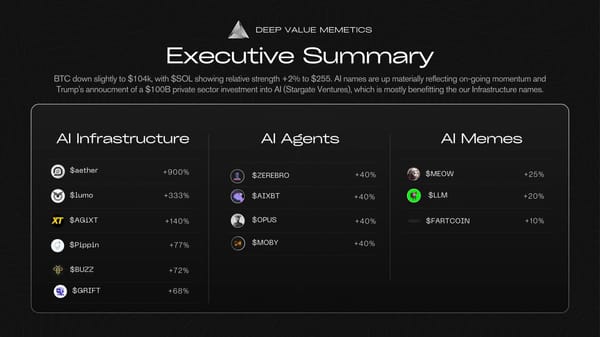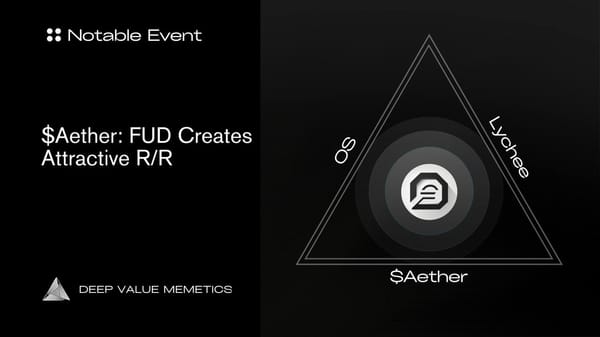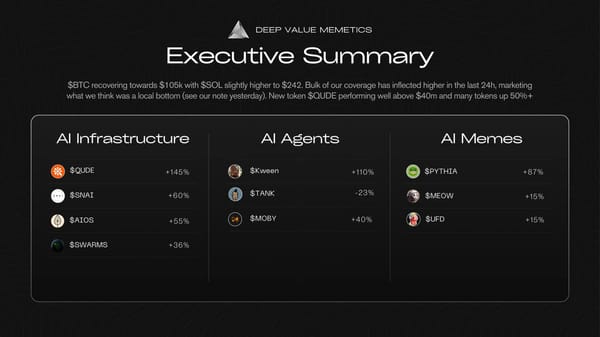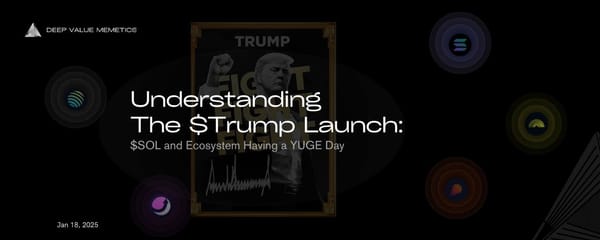$AETHER Appears Undervalued in the Swarm Sector. Foray into Gaming Offers Attractive Free Call Option.

Spotlight Research | $AETHER (11m FDV) | @aetherdotfun Via @litm_sol
DVM View: $AETHER is a cognitive mesh framework for self-organizing autonomous intelligence (modular and scalable). $AETHER at $11m FDV appears undervalued vs current swarm peer group ( $SWARMS/$300m, $SNAI/$90m ) with similar use cases (delegation, multi-modal processing, swarm intelligence) and a team that’s executing, with their latest focus on agent integration into gaming (Minecraft, Fortnight).
Consequently, we would expect pick-up in developer activity. Lastly, indication of a rewards pool likely drives usage and loyalty incentives.
What is the project about? | A modular AI framework empowering autonomous agents for decentralized collaboration.
The Aether Framework is a modular, decentralized AI framework designed to empower autonomous agents with advanced capabilities such as reinforcement learning, swarm intelligence, multi-modal processing, blockchain interaction, and democratic decision-making.
The project aims to foster collaboration between human creators and AI agents within decentralized systems. By leveraging autonomous agents and decentralized communication nodes, Aether provides a platform for developers to build intelligent agents that adapt, compete, and collaborate in dynamic environments.
These agents operate in domains such as gaming, social media management, and content creation. Notably, Aether incorporates swarm-based collaboration, multi-modal task execution, IPFS integration, and reinforcement learning for self-optimization.
The introduction of JEDI (Jailbroken Enhanced Digital Intelligence) further demonstrates the framework's real-time capabilities.
Aether Framework’s GitHub repository has garnered attention with 20 stars, 6 forks, and 33 commits, reflecting growing interest among developers.
Its modular design supports dynamic task allocation, fault tolerance, and efficient resource utilization.
Swarm behaviour is a central concept, allowing agents to autonomously propose and vote on tasks within a decentralized governance system.
The framework integrates with tools like Hugging Face, making it accessible to both developers and non-technical users.
Additionally, the Aether token introduces an economic model where tokens are used to access AI functionalities which not only expands its useability but also token holders are rewarded for the ecosystem’s growth, aligning user engagement with platform success.
How does the project work? | Enables decentralized, modular AI agents to collaborate, evolve, and execute tasks using blockchain, IPFS, and advanced learning mechanisms.
The Aether Framework operates on a highly modular and decentralized architecture, enabling developers to customize and extend its functionalities.
Its decentralized nature is powered by IPFS for secure peer-to-peer communication and storage, while blockchain integration ensures trust less operations using Ethereum and Solana.
Aether agents are autonomous entities that evolve and collaborate using swarm behavior, reinforcement learning, and consensus mechanisms.
These agents can handle diverse tasks like designing virtual landscapes in games, strategizing, and managing social media autonomously.
Multi-modal processing capabilities allow them to work with text, images, and audio data, while a knowledge graph maintains relationships and information across agents, ensuring seamless task execution.
What technology or infrastructure does it use? | Relies on Python, blockchain integration, IPFS, Redis, and cloud services to power decentralized AI systems
The Aether Framework is primarily built using Python, with some HTML integration. It employs Ethereum and Solana blockchains for secure operations and plans to support Polkadot and Cosmos in the future.
Decentralized file storage and retrieval are facilitated by IPFS, while Redis is used for distributed task management.
Data management is supported by databases such as MongoDB, Neo4j, Qdrant, and SQLite.
Aether also integrates with cloud services like AWS, GCP, and Azure for hybrid deployments and leverages APIs for additional functionalities.
These technologies form the foundation of a robust system capable of handling large-scale AI deployments.
What problems does it solve? | Tackles centralization, scalability, collaboration, and security challenges in AI and decentralized systems.
Aether addresses several key challenges in the AI and decentralized systems space.
It provides an alternative to centralized systems by offering decentralized AI operations, reducing reliance on central control.
The framework's scalability allows for the deployment of AI agents in diverse environments, from gaming to disaster response.
It enhances collaboration through multi-agent coordination for task delegation and knowledge sharing.
Additionally, Aether ensures privacy and security by utilizing blockchain and IPFS for transparent, secure, and privacy-preserving operations.
Who are the founders, and what is his vision? |
The Aether Framework is led by Liam, an experienced AI developer with a specialization in decentralized systems and autonomous agents.
His vision is to create modular, adaptive systems that advance AI collaboration and innovation, pushing the boundaries of what AI can achieve in decentralized and collaborative environments.
What is the roadmap or future potential of the project?
The project's current milestones include enhancing fault tolerance for distributed networks, supporting Solana and Arbitrum integrations, and developing a GUI dashboard for real-time swarm insights.
Future goals involve integrating federated learning for privacy-preserving model training, IoT and Edge AI integration for local decision-making, and creating decentralized marketplaces where agents can autonomously operate.
Use cases for Aether include coordinating autonomous drones for disaster response, optimizing logistics and cloud resources, facilitating decentralized scientific research, and enabling AI agents to build, strategize, and collaborate in gaming environments like Minecraft and Fortnite.
Comparison Analysis with other swarm projects
$Aether, $ARC, $SNAI, and $Swarms each present unique approaches to AI agent development and deployment.
Aether stands out for its decentralized ethos, combining blockchain technology with swarm intelligence for applications in gaming and content creation, focusing on autonomous, self-optimizing agents.
ARC's Rig, built in Rust, offers a modular, high-performance framework for developers to integrate LLMs into applications, emphasizing simplicity and efficiency with its abstractions.
SNAI provides a serverless solution akin to AWS Lambda but specialized for AI agents, eliminating server management and focusing on chaining and orchestration of AI tasks.
Meanwhile, Swarms targets business automation, promoting collaboration between multiple AI models with an emphasis on scalability, ethical AI development, and deep third-party integration.
Each framework caters to different developer needs: from those interested in decentralized AI ecosystems to those seeking performance, ease of deployment, or comprehensive business automation tools.

References:
CA: BEP6KhDwv7K211JtZnszNcztHBffSCgRjUuNhucopump
Dev: https://x.com/litm_sol
Web: https://aetherframework.fun
Github: https://github.com/AetherFrameworkAI/aether-framework…
Docs: https://aether-framework.gitbook.io/aetherframework
Telegram: https://t.me/aetherdotfun




